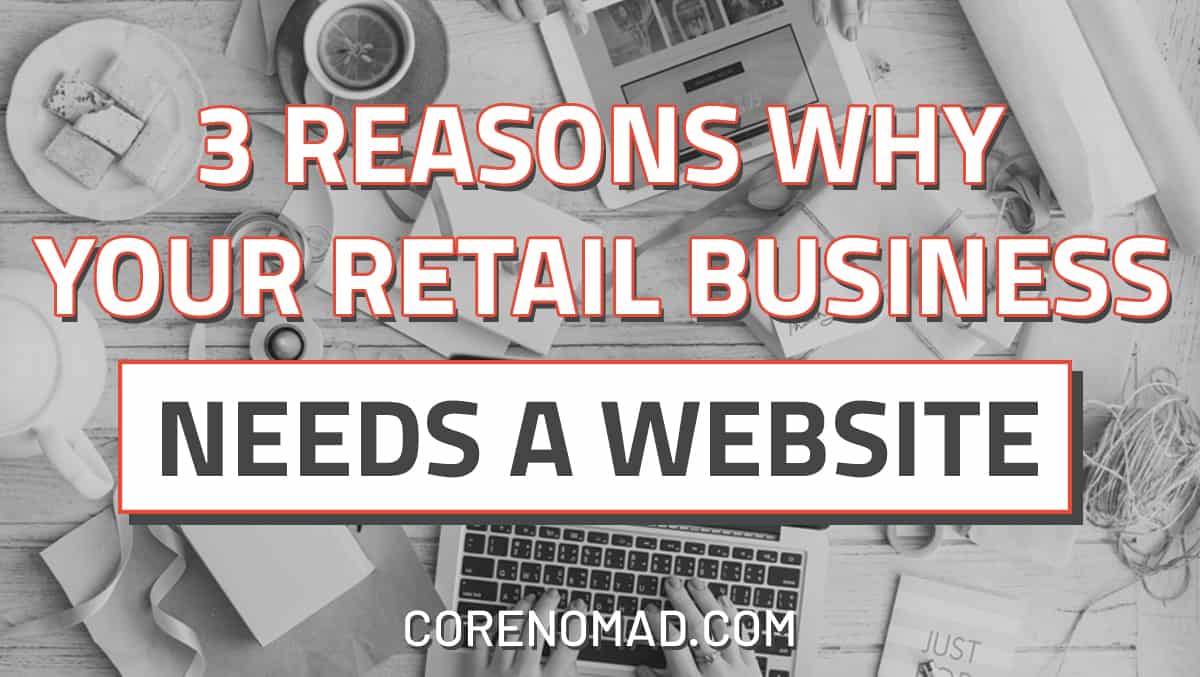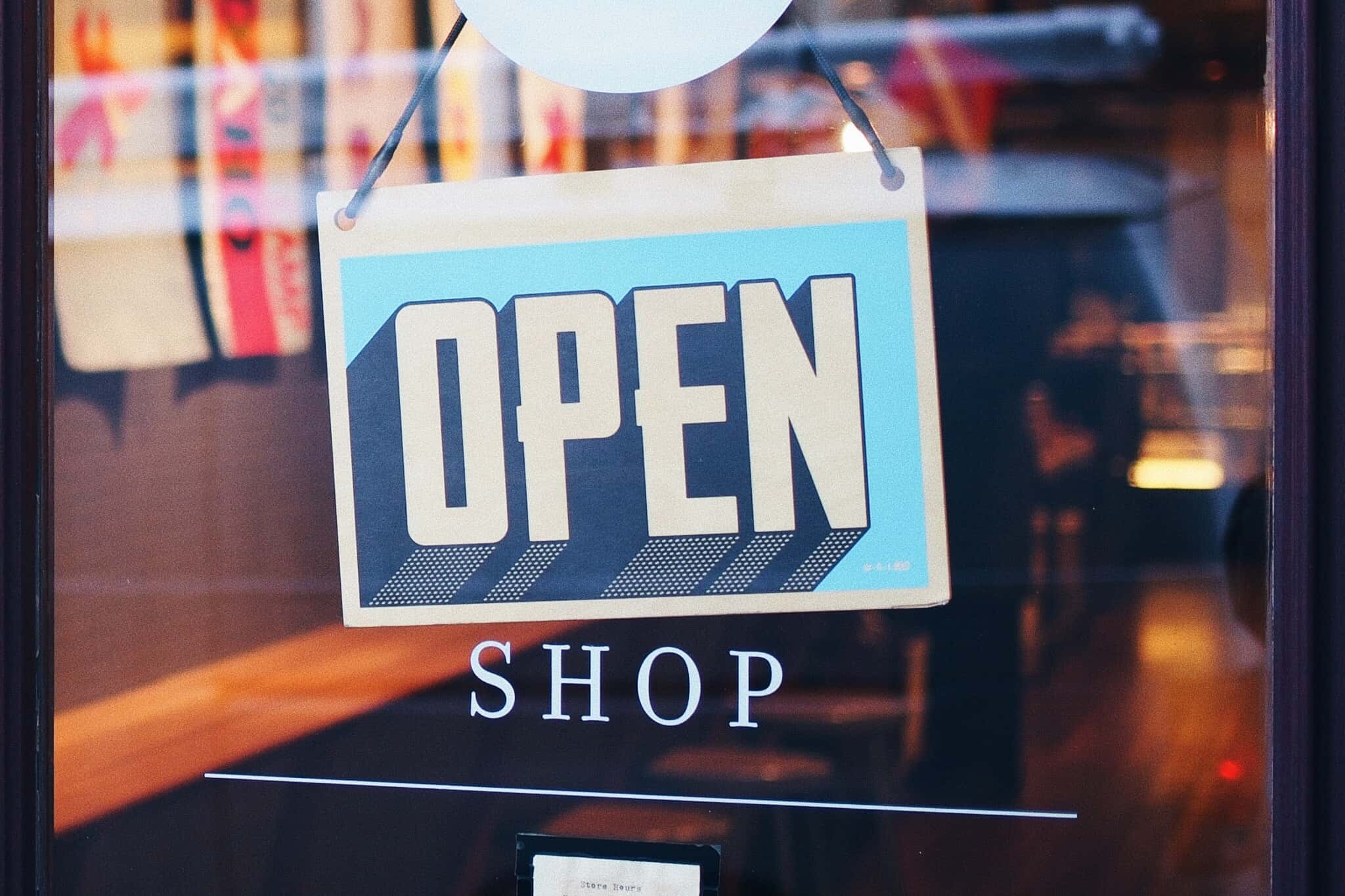
As a business owner, you probably hear it from your friends, family, and customers over-and-over again. “Why don’t you have a website?” may be the most popular question you get asked this year. But you own a retail business – you pay thousands of dollars per month to put your products in a physical storefront. Why should you pay even more to get another storefront set up in the digital world? Here are 3 reasons why your retail business seriously needs a website.
1. Establish Trust With Your Customers

For starters, your business website (or lack thereof) impacts and influences how customers feel about your business. Research indicates that 75% of users admit to making judgements about a company’s credibility based on their website design (Stanford University). There’s a reputation element here that can’t be ignored – not having a website in today’s world can be perceived as a sign that you’re unwilling to invest in your own business. The last thing you want is for potential and existing customers to think you don’t care about the business you’ve given your blood, sweat, and tears to.
It goes well beyond simply showing that you care, though. Having a website gives you the opportunity to go on the offensive when it comes to the establishing and building reputation of your business. In 2018, online reviews on Google and Facebook are increasingly becoming one of the most important factors in determining the success or failure of a local business. Research shows that 90% of consumers read online reviews before actually visiting a business (BrightLocal). This boils down to the concept of “social proof” – consumers seek to read about positive experiences from other consumers before making a purchase decision.
However, there’s just one problem with Google and Facebook when it comes to reviews – you have no control over the content, quality, and display of the customer feedback. Have some rave reviews for your business from one year ago? They may be pushed to the bottom of the Facebook feed, never to be seen by potential customers. Had one particular bad experience with a customer who just wanted to make your life miserable? Google may automatically deem it as one of the “most relevant” reviews for your business. As evidenced by Google’s recent removal of reviews for many businesses, the critical customer feedback you receive, the feedback that determines the success of your business, is completely in control of the platform providers.
In contrast, your website is a place where you control the narrative. It’s gives you the opportunity to display positive reviews from your satisfied customers without fear that the feedback will be misplaced or expunged by Google or Facebook. First impressions do matter – for a person who recently learned about your business, seeing satisfied customers may be the key factor in determining if they want to purchase from you. Don’t let that first impression be a “relevant review” from an unhappy customer on Google.
(Quick tip: you can also display accreditations on your website to further solidify your reputation and build trust with your customers!)
2. Showcase Your Products & Services

How do you provide value to your customers as a retail business? At the end of the day, you’re solving the problem of providing the right products (and supporting services) to your customers. But how will your customers know if you can solve their problems and provide the right products without physically visiting your retail store? There are really only two options: the customers can call your store, or they can search for you on the web. Research shows that the online search option is winning – as of 2016, 76% of consumers go online to research a product or service before making a purchase at an actual store (Local Search Association). Your customers will look for your business online, whether you have an established presence or not, and what they find will determine the next steps they take.
Here’s a good comparison – let’s consider your physical retail shop as it stands today. If you don’t sell online or in any local marketplaces, it’s safe to assume that every customer has to walk into your store to make a purchase from your business. Given that fact, you probably do everything in your power to keep the front of your retail store as tidy and professional as possible. Why? Because that’s where your customers shop for your products, and you want to make sure they have the best experience possible when doing so.
As proven by the stat above, your customers are looking for your business online. Having no website is like having a completely blank office space for your retail store. No address, no name or sign above the door, no products displayed, no prices, no people to greet them. When these customers of yours go online to find your business, they’re greeted with nothing at all. It’s safe to say that this situation won’t lead to a customer who’s excited to purchase from your business.
At the end of the day, not having a website is simply missing an opportunity to show potential customers that your store is the place to shop for whatever they’re looking for.
3. Grow & Enhance Your Business
![]()
Technology is changing the world, and your customers are changing with it. As of 2016, 79% of consumers in the United States shop online, and 65% of those consumers actually prefer to shop online instead of heading to a physical retail store (Pew Research Center). Ecommerce is both broadening business horizons and blurring the lines of competition in the retail world. Back in the day, a small clothing store in rural Ohio would only compete with the local clothing shops and possibly the big box stores in neighboring cities. Now, that same clothing store is competing with tens of thousands of online clothing stores across the web. But there’s opportunity in this madness – getting a website for your business means opening the door to being able to sell products to your customers online and growing your both business locally and nationally.
(Interested in giving ecommerce a shot for your store? Head over to Shopify for a free 14-day trial of the best ecommerce software on the market.)
Now, you may be thinking that you’re definitely not ready for the whole ecommerce/online store thing. The fact of the matter is that an ecommerce storefront is not a requirement for actually getting a website for your business. Sure, your customers may want/expect it (and you may be missing out on a growth opportunity), but the true purpose of any website is to drive attention, traffic, and sales to your store. Don’t get me wrong – I certainly encourage you to seriously consider selling your products online (it’s not as hard or expensive as you think!). However, don’t let the thought (or fear) of ecommerce dissuade you from moving forward with the incredibly important and necessary step of setting up a website for your store.
The business growth opportunity certainly extends beyond ecommerce as well. Every day, there are potentially hundreds (or thousands) of Google searches for the products you sell which source from individuals who live within a 50 square mile radius of your retail store. However, your business can only show up for these searches if you actually have a website for Google to present! Do your part and give those potential customer an opportunity to find you online before they find your competitors.
A website can also serve as the starting point for incorporating modern technology into your business. One common example is using an online scheduling tool to save the back-and-forth when attempting to book customer appointments. Another example is using live chat software to answer customer questions and offer customer service on a day-to-day basis. And this is just the start – you can also use online tools to collect and analyze in-depth customer data, implement email acquisition strategies, link your website to your social media accounts, and implement automated customer growth strategies. The possibilities are truly endless when it comes to tying software into your website to grow your business.
Side Note – Social Media Pages
You may be thinking “Hey, I have a Facebook page for my business. That’s just as good as a website, right?” First off, great job! Having an active Facebook page is an excellent step in the right direction. However, your Facebook page belongs to… well, Facebook. The design, format, functionality, and content distribution of your store is in Facebook’s control, now and always.
Also, Facebook is, by nature, a social media platform – not a hub for your business. It’s like having a booth in a farmer’s market: sure, you get to greet customers, show your products, and even make some sales at the booth. But at the end of the day, you answer to the rules and procedures of the individuals who own the farmer’s market. If the owners decide to shut down the market, you shut down with it. It’s the same with Facebook – you’re one algorithm change, one line of code, away from losing access to any audience you’ve built or work you’ve put into your business’s Facebook page. Though social media pages are a valuable part of your online portfolio, don’t get caught in the trap of expecting them to replace a standalone website for your business.
Conclusion
When it comes to getting a website for your retail business, the facts don’t lie – studies show that 34% of consumers are unlikely to buy from a business if they don’t have a website (Local Search Association). With a website, your business can build trust, present products, and acquire more sales from new and existing customers. Without a website, your business will lack credibility, give customers to the competition, and fail to achieve long-term growth.
Make the investment into communicating who you are, what you offer, and what sets you apart through a modern, professional website today. The success of your business may depend on it!
